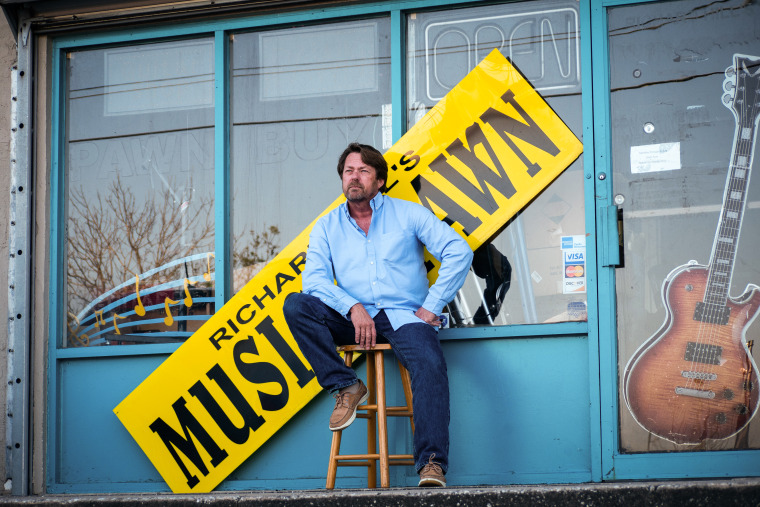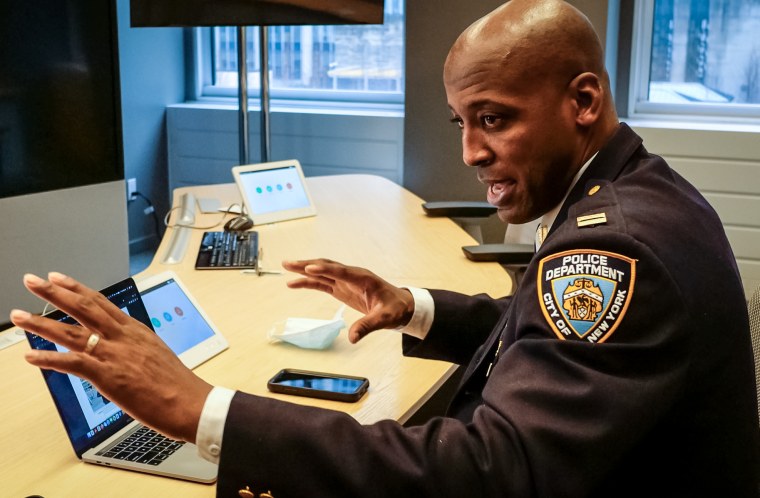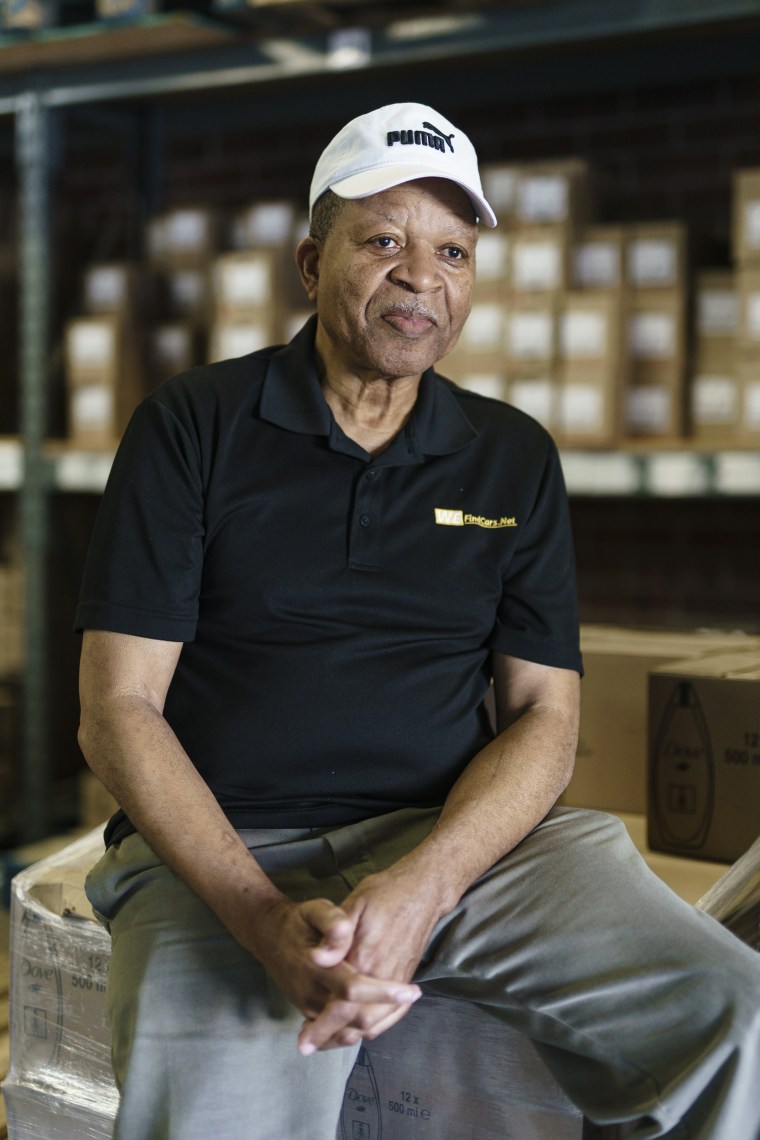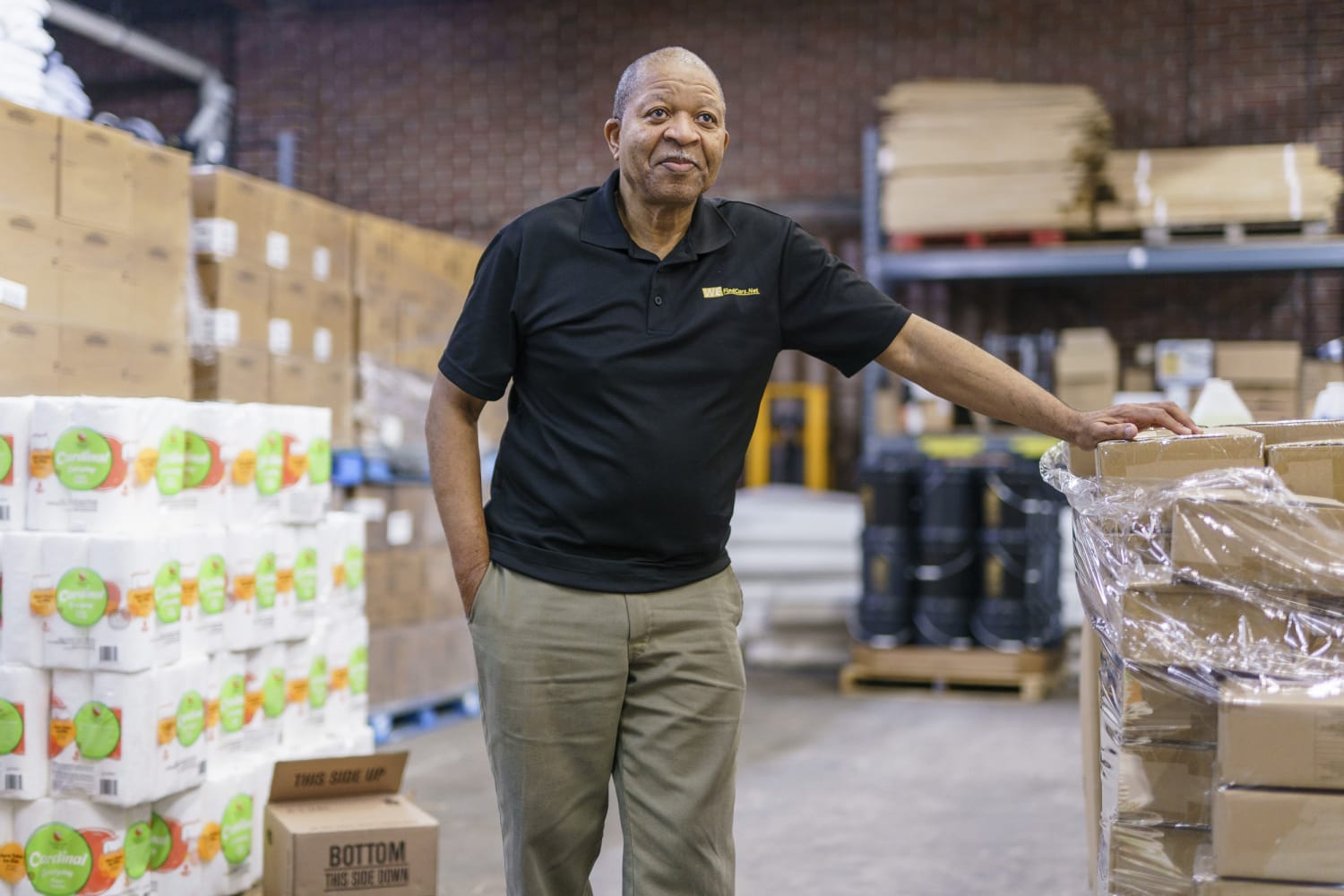Investigators also tailed suspected shoplifters tied to Whitley driving as far as Florida and South Carolina to see what or if they would steal, Dugan said. CVS successfully pitched the case to the FBI, and soon federal agents picked up where the retail investigators had left off. According to court documents, in 2017 they set up a “pole cam” in front of Whitley’s warehouse for an added set of eyes.
The surveillance continued until late 2019. All the while, neither Whitley nor his oldest daughter, Noni, who helps manage the business, had any idea they were being watched.
“I was shocked, just shocked,” Noni said.
Federal agents raided the warehouse and the Whitleys’ homes in November 2019 and seized more than $1 million in stolen goods, prosecutors said. Noni Whitley, who also pleaded guilty, was sentenced to five years in prison.
In interviews with NBC News, the Whitleys admitted to buying stolen products off of boosters, but contend that the value was nowhere near millions of dollars. Noni Whitley said they didn’t have the money to hire their own forensic accountant to dispute the dollar amount, which is tallied by the retailers themselves and used by prosecutors to argue for higher sentences.
‘We are trying to solve this problem’
It’s difficult to quantify the full scope of organized retail theft because the crime can be broken down into multiple classifications and most law enforcement agencies don’t differentiate whether a shoplifter was a lone assailant or part of a larger network.
Moreover, retailers don’t always report shoplifting to the police nowadays. Some national chains say they encourage their workers not to call 911 — to avoid tying up local police — and instead report crimes to in-house investigators.
“We are doing this because we are the victim, and we are trying to solve this problem,” Mike Combs, director of asset protection for Home Depot, said of the role corporate investigators play. “I don’t think there’s enough officers to handle every retailer’s case. You’ve got to help them out.”
Local and federal officials said they happily take any documentation that retailers are willing to share, which often includes in-store security footage, outdoor surveillance images and files gleaned from shoppers’ databases.
“They often give us evidence. They give us leads,” said Kurt R. Erskine, the U.S. Attorney for the Northern District of Georgia, who oversaw Whitley’s prosecution. “We don’t ever use them as a surrogate for our own investigation. But they can be incredibly valuable partners.”
Registries and databases that track people who make returns without receipts are another deep well for retail investigators. Stores ask shoppers to show proof of identification during such transactions, and court filings show that big box stores keep the information on file.
When police detectives in Ohio found the cellphone number of a man selling stolen tools on Facebook Marketplace in 2019, a detective called Lowe’s. The home repair chain found his phone number in a registry that collects personal information when customers make returns without receipts, said the Perrysburg Township Police Department. That led officers to get a warrant to raid the man’s home, where they found more stolen items.
The man is now serving a five-year sentence in state prison for helping to lead a stolen power tool ring. Lowe’s spokesman Steve Salazar said the chain provides customer information to police – without the need for a warrant or a subpoena – when the retailer is targeted in a crime. “Lowe’s will continue to prioritize the safety and well-being of our customers and associates,” Salazar said.
The Ohio case troubles Clark Neily, vice president for criminal justice at the Cato Institute, a libertarian think-tank. Neily said there is an absence of court rulings that could provide a check on corporations that freely share customers’ personal information with law enforcement.
“The government’s ability to acquire information about you without a warrant, simply because you have engaged in commerce with a particular company, is much greater than the average person would expect,” Neily said. “The law has not really kept up. There needs to be more in ensuring that companies do not step over the line.”
The lengths retail investigators go in building cases against shoplifting rings — following people across state lines, for instance — also raise questions, policing experts said.
“These retail companies are deputizing themselves as law enforcement and are choosing who to surveil and there’s no oversight at all,” said Ángel Díaz, a lecturer at UCLA Law School who specializes in police surveillance.
Spokespeople for CVS, Target and Home Depot pushed back on the suggestion that their investigators operate without oversight. They noted that judges must sign off on search warrants whenever law enforcement agencies act on evidence provided by retail investigators. The spokespeople also said their investigators undergo extensive training and only surveil people in public places.
“Our investigators operate with specific directives,” said Brian Harper-Tibaldo, a Target spokesman. “Actions such as conducting interrogations, serving warrants or making arrests are managed by law enforcement, not Target investigators.”
But not all retail investigations result in successful prosecutions.
In 2017, Home Depot workers in Florida noticed that thieves were stealing pool pumps and power tools.
Law enforcement documents show that workers didn’t report the thefts to police. Instead, in-house investigators got to work. They ran plate numbers of getaway cars caught on store security cameras, and cross-referenced drivers’ names in databases that identify people who had made returns without receipts. They questioned men caught stealing tools and asked for the names of their accomplices.

Home Depot presented the case to the Volusia County Sheriff’s Office. Detectives checked local pawn shop records to see if any of the boosters had offloaded merchandise. They discovered that at least two were repeat customers of a Richard Hill whose shop was filled with still-in-the-box Home Depot tools, according to the sheriff’s office.
But at the time Hill bought the items, Home Depot had not reported them as stolen to the Volusia County Sheriff’s Office.
Hill told NBC News that he had no way of knowing that he had purchased illicit goods.
“Home Depot hadn’t been telling police that these things were being stolen. They were letting it pile up,” Hill said. The sheriff’s office labeled Hill as the mastermind of a nearly $1 million power tool theft ring.
Months later, the judge dismissed the case after Hill’s attorney argued that there was insufficient evidence showing that his client intentionally bought pilfered products. Despite having his name cleared, Hill said his life is ruined.
“Now here I am — no business, financially hurt, a reputation that’s crushed in the town that I grew up in,” Hill said.
Christina Cornell, a Home Depot spokeswoman, said the retailer had reported the rash of thefts to some law enforcement agencies around central Florida but they didn’t have enough details to list the products’ unique identification numbers in the reports. That means pawn shops would have had no way of knowing they had stolen products in their possession.
“Our teams worked to gather the best information possible, within their limits, to help law enforcement with their investigation,” Cornell said.
A long history
The close working relationship between retailers and the police dates back to the mid-2000s, when Target made its high-tech forensic crime lab available to law enforcement agencies across the country.
Bill Bratton, who was in charge of the Los Angeles Police Department at the time, told NBC News that he used the lab to help reduce the city’s forensic backlog and set in motion a partnership which became a nationwide model. “Police clearly don’t have the resources to do it on our own,” Bratton said. “So that’s why there’s the need for police retail collaboration.”
Bratton and Target went on to spearhead the launch of a private database that allowed police and retailers to input shoplifting incidents, track suspects and the items they were stealing. After he took over the New York Police Department in 2014, Bratton helped to oversee the creation of the Metro Area Organized Retail Crime Alliance, or Metro ORCA, which introduced the Los Angeles model to New York. More than 125 agencies spanning New Jersey, New York and Pennsylvania are now using the database.

“It gives law enforcement through the region a chance to search: ‘What does anybody else have out there’?” NYPD Capt. Tarik Sheppard, Metro ORCA’s executive director, said while scrolling through the database. “Everybody’s going to have bits and pieces of the whole pie.”
Dozens of shoplifting databases are now up and running in cities and states from coast to coast, from Florida to Idaho to Oregon.
Leaders of large-scale retail theft rings often recruit people from vulnerable communities — drug addicts, undocumented immigrants, the homeless — to work as shoplifters, according to court documents and law enforcement officials. The ringleaders tend to be adept at using sites like Facebook Marketplace, Ebay and Amazon, to traffic stolen goods, officials said.
CVS’s top investigator said the proliferation of online marketplaces is one of the main reasons organized theft is still so hard to quell.
“It’s just gotten bigger and bigger,” Dugan said.
‘A hell of a business’
Whitley’s business raked in more than $3.5 million in sales through Amazon Marketplace from 2011 to 2018, prosecutors say. But it suffered a major blow when Amazon froze his accounts in 2018, a year before the feds raided his warehouse, Whitley said.
Four years later, his business is still going strong.
On a Tuesday in March, he gave an NBC News reporter a tour of his warehouse filled with name and off-brand paper goods, soap and other products.
“The first rule,” he said at one point, pausing for emphasis. “Price sells.”

Cut off from Amazon, Whitley said he now sells to “street vendors” nationwide. But he’s a bit hazy on the details of where some of his merchandise comes from.
He walked over to a pile of boxes and pulled out a package of Dove body soap.
“I never would have started buying stolen stuff if I had some of this here back in the day,” he said.
He said he pays $33 for a case of 12 bottles of Dove, which he sells for $4 per bottle or $10 for three.
“I buy it from a legitimate business out of New York,” Whitley said. “Big white boy. He sells me a lot of stuff.”
Then he turned to the side and looked out across his warehouse.
“This is a hell of a business, baby,” Whitley said.
Source: | This article originally belongs to Nbcnews.com










